United Arab Emirates Army
As part of the military of the United Arab Emirates, the United Arab Emirates Army is responsible for land operations.
| United Arab Emirates Army | |
|---|---|
| Founded | 1951 |
| Country | |
| Branch | Army |
| Role | Ground warfare |
| Part of | UAE Armed Forces |
| Garrison/HQ | Abu Dhabi |
| Colors | Black and Desert Sand Camo |
Origins
The origins of the UAE Army begin with the formation, by the British Government, of the Trucial Oman Levies in 1951 (re-named Trucial Oman Scouts in 1956). The Trucial Oman Scouts was disbanded with the formation of the United Arab Emirates in 1971 and its assets were subsumed into the new "Union Defense Force (UDF)" in which each Emirate was responsible for training and equipping its own forces. These separate "Ruler-Controlled" Armed Forces included: the Abu Dhabi Defense Force (1965-1976), the Ras Al Khaimah Mobile Force (1968-1976), the Dubai Defense Force (1970-1976) and the Sharjah National Guard (1972-1976). It was not until the formation of the United Arab Emirates Armed Forces on 6 May 1976 that the UAE and its Army had a unified, federally controlled General Headquarters based in the capital Abu Dhabi.[1]
Operational history
.jpg.webp)
Union Defense Force (1971-1976)
With the Union of seven Emirates in 1971, a new Union Defense Force (UDF) was established with each individual Emirate responsible for maintaining their own force.
While the UDF's mission was to defend the nation from external and internal aggression, the role of the UDF in the early years was restricted mostly to the former. The UDF were used on two occasions in Sharjah in the early years of the Union.
Sharjah-Fujairah border conflict
In February 1973 following a brief border war between armed Bedouin tribesmen from both Sharjah Emirate and Fujairah Emirate over a disputed area of land which covered a quarter of an acre and included water wells and date palm trees. 22 people were killed and another 12 were wounded before UDF troops were able to impose a ceasefire.
Sharjah-Dubai border conflict
On 20 August 1973, an incident occurred at Tawi Nizwa on the Sharjah-Dubai border. Tawi Nizwa was a small inland settlement which both Sharjah and Dubai claimed was in their territory. Dubai had recently drilled a water well at the location. On 20 August, A Dubai Defense Force helicopter flew over the site to view developments on the ground. Sharjah forces on the ground fired at the helicopter. It was hit some 43 times and forced to land. No-one was injured. The conflict could have escalated into a conflict but did not thanks to the personal intervention of Sheikh Zayed bin Sultan Al Nahyan in his role as Ruler of Abu Dhabi and President of the United Arab Emirates. This incident would have a major role in the integration of the diffused UDF into the centralized Armed Forces of the UAE in 1976.[2]
Oman (1973-1975)
An ADDF infantry squadron was based in Sohar, Oman from October 1973 to January 1974 and from November 1974 to April 1975. Its role was to relieve the Oman Gendarmerie unit in Sohar so the latter could deploy to Dhofar province in the south in order to combat rebel activity there during the Dhofar Rebellion.[3]
Armed Forces of the United Arab Emirates (1976-present)
In the five years since 1971, the UAE federation went from strength to strength and a subsequent decrease in internal aggression was apparent. It was agreed by the Rulers of the various Emirates to unify and integrate the various forces of the UDF into one centralized Armed Forces. This occurred on 6 May 1976 and the various Emirate-controlled forces were reorganized into regional commands: Abu Dhabi Defense Force became Western Military Command, Dubai Defense Force became Central Military Command, and Ras Al Khaimah became Northern Command. Sharjah's armed force merged with the remnants of the federally controlled UDF to create the Al Yarmouk infantry brigade.[4] The UAE Armed Forces also participated in some of its first overseas missions.
Arab Deterrent Force in Lebanon (1977-79)
The UAE Armed Forces contributed 750 men to the Arab Deterrent Force peacekeeping mission in Lebanon from 1977 to 1979, organized by the Arab League in October 1976. Five UAE contingents were deployed in the Bekaa Valley during the Lebanese Civil War. Three UAE Armed Forces personnel were killed in action, and eight injured.[5]
First Gulf War (1990-91)
During the War against Iraq, UAE troops reported that they have deployed several thousands of men in that engagement. They participated in the conflict as part of the GCC-led Peninsula Shield force that advanced into the city of Kuwait. United States military aviation bombed the Iraqi positions from the UAE, and United States ships operated out of UAE ports along the coast of the Persian Gulf. The UAE Air Force also carried out strikes against Iraqi forces. A total of ten UAE combat deaths and 15 wounded were reported as a result of these battles.
Somalia (1993-1994)
From January 1993 to April 1994, the UAE Armed Forces participated in humanitarian operations in Somalia under the United Task Force (UNITAF) and UN Operation in Somalia II (UNOSOM II). UAE land forces supplied a 640-man group in four rotations during this period. Three UAE Armed Forces personnel were killed in action.[6]
Kosovo & Albania (1999-2001)
The UAE Armed Forces participated in two peacekeeping/humanitarian missions in the Balkans over the 1999-2001 period: NATO-led Operation Kosovo Force (KFOR) and Operation White Hands. Almost 1,500 Emirati troops served in the two missions.[7]
Afghanistan (2003-2014)
The UAE and its Land Forces participated in the NATO-led International Security Assistance Force (ISAF) mission (2001-2014) and committed to contribute to the follow-on mission of ISAF; the NATO-led Operation Resolute Support (2015-).[8]
Yemeni Civil War (2015-present)
During the 2015 Yemeni Civil War the United Arab Emirates Army (together with Saudi Army soldiers) intervened in support of fighters loyal to the ousted regime of Abd Rabbuh Mansur Hadi against Houthi militants. UAE troops assisted anti-Houthi fighters in the re-taking of the strategic southern Yemeni port city of Aden and also Al Anad Air Base, the largest airbase in Yemen.
On 4 September 2015 the army suffered its heaviest loss in modern history, losing 52 soldiers in war in Yemen to a tactical ballistic missile strike.[9] The UAE has since deployed an entire armoured brigade to Yemen.[10]
Up until November 2017 the UAE forces have suffered 120 dead.[11]
On 3 May 2018, the United Arab Emirates deployed over 100 troops, artillery and armoured vehicles to the Yemeni archipelago of Socotra in the Arabian Sea without prior coordination with the internationally recognised Government of Yemen.[12] Shortly after landing, UAE forces expelled Yemeni soldiers stationed at key installations, including Socotra Airport and the flag of the United Arab Emirates was raised above official government buildings in Hadibu.[13]
Army equipment
Vehicles
| Model | Image | Origin | Type | Number | Notes |
|---|---|---|---|---|---|
| Armoured vehicles | |||||
| Leclerc tank | 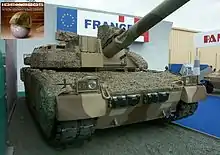 |
Main battle tank | 434 | 388+46 armoured recovery vehicles, as of March 2018. | |
| Reconnaissance vehicle | |||||
| FV101 Scorpion | .jpg.webp) |
Reconnaissance vehicle | 76 | ||
| Armoured personnel carrier | |||||
| AMX-13P |  |
Armoured personnel carrier | 11 | ||
| Patria AMV |  |
Armoured personnel carrier | 40 | The United Arab Emirates Army ordered[14] an initial evaluation batch of 15 vehicles.[15] Some of these vehicles will be equipped with the Patria Nemo turret while others will be equipped with BMP-3 turrets and have therefore been slightly modified, including a somewhat longer hull.[16] In January 2016, the General Headquarters of the UAE armed forces ordered 40 Patria AMV hulls with the option of 50 more.[17][18] The vehicles were shipped in June 2016 from Patria's Polish production line.[19] The Patrias are used in Yemen in combat operations.[20] | |
| EE-11 Urutu | .jpg.webp) |
Armoured personnel carrier | 60[21] | ||
| BTR-3 | .jpg.webp) |
Armored personnel carrier | 90 | Used by UAE Marines and 90 Guardians.[22] | |
| Infantry fighting vehicle | |||||
| FNSS ACV-15 | 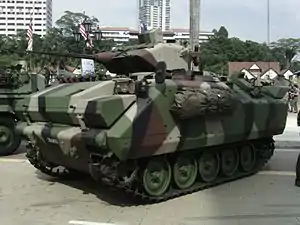 |
Armored fighting vehicle | 133 | [23] | |
| BMP-3 | 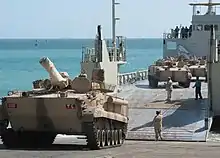 |
Infantry fighting vehicle | 598 | 250 for Abu Dhabi & 402 for Dubai[24] (of which 391 delivered in 1992–1997) with "Namut" thermal sight and other modifications. They are under further upgrade with modular armour "Kaktus" and UTD-32 engine.[25] | |
| AMX-10P | 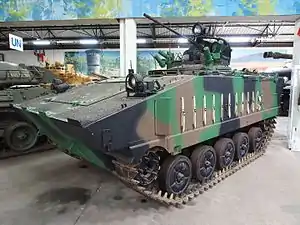 |
Infantry fighting vehicle | 18 | ||
| Non-combat armoured vehicles | |||||
| Nimr | Multipurpose wheeled vehicle | 3,000 | |||
| Oshkosh M-ATV |  |
Mine-Resistant Ambush Protected | 794 | ||
| International MaxxPro |  |
MRAP Category 1 & 2 | 3,375 | 3,375 MaxxPros of various versions on order.[26] | |
| BAE Caiman |  |
MRAP Category 1 & 2 | 388 active 321 available 222 operational |
In September 2014, the U.S. approved a $2.5 billion deal with the United Arab Emirates Army for over 4,500 surplus U.S. MRAPs for increased force protection, conducting humanitarian assistance operations, and protecting vital international commercial trade routes and critical infrastructure. 1,150 vehicles were Caimans.[26] | |
| RG-31 Nyala | 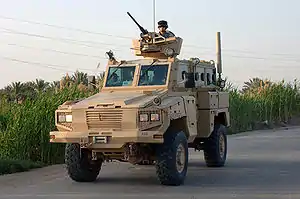 |
Infantry mobility vehicle | 76 | ||
| TPz Fuchs |  |
NBCRS (Nuclear Biological Chemical Reconnaissance System) | 32 | 32 Fuchs 2 NBC reconnaissance vehicles ordered in February 2005 under a contract valued at EUR160 million (US$205 million).[27] The order comprises 16 NBC reconnaissance vehicles, eight bio vehicles and eight command post vehicles, which will provide the UAE with a complete NBC detection capability linked to a command-and-control system.[27] | |
Artillery and air defence
| Model | Image | Origin | Type | Number | Notes |
|---|---|---|---|---|---|
| Self-propelled artillery | |||||
| G6 howitzer |  |
Self-propelled artillery | 78 | 78 systems[28] | |
| M109 howitzer |  |
Self-propelled artillery | 87 | 40 (from Switzerland) | |
| Mk F3 155mm | 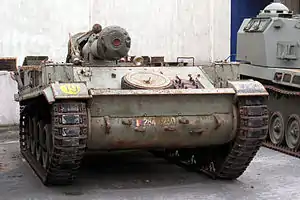 |
Self-propelled artillery | 18 | ||
| Artillery and air defence | |||||
| Jobaria Multiple Cradle Launcher | 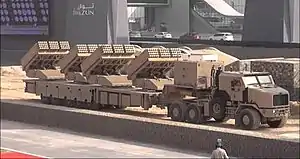 |
Multiple rocket launcher | 24 | World's largest multiple rocket launcher unique to the United Arab Emirates Army. | |
| BM-21 Grad |  |
Multiple rocket launcher | 48 | ||
| M142 HIMARS | 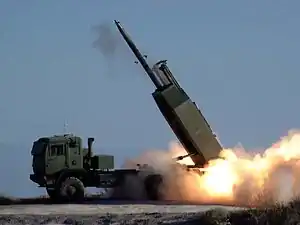 |
Multiple rocket launcher | 20 | ||
| SR-5 | Multiple rocket launcher | [29] | |||
| Towed howitzer | |||||
| L118 light gun | _(4110022946).jpg.webp) |
Field gun | 56 | ||
| Type 59 |  |
Field gun | 20 | Type 59 variant[21] | |
| Surface-to-air missile | |||||
| Rapier | 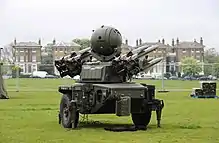 |
Short-range surface-to-air missile | 24 | ||
| Pantsir-S1 | _(521-05).jpg.webp) |
Surface to air missile self-propelled anti-aircraft weapon | 50 | ||
| MIM-104 Patriot | 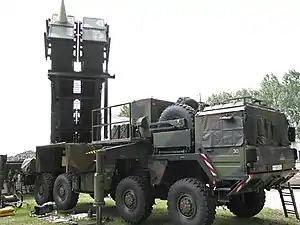 |
Surface-to-air missile | PAC-3 variant | ||
Infantry weapons
| Model | Image | Origin | Type | Caliber | Notes |
|---|---|---|---|---|---|
| Handguns | |||||
| Browning Hi-Power | .jpg.webp) | Handgun | 9×19mm Parabellum | [30] | |
| Heckler & Koch P7 | .jpg.webp) | Handgun | 9×19mm Parabellum | P7M13 variant.[30] | |
| Caracal pistol | 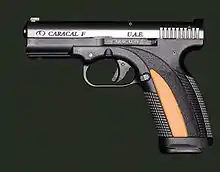 | Handgun | 9×19mm Parabellum | Primary service issued pistol.[31] | |
| SIG P228 | .jpg.webp) | Handgun | 9×19mm Parabellum | ||
| Submachine guns | |||||
| Heckler & Koch MP5 | 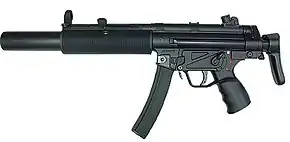 | Submachine gun | 9×19mm Parabellum | . | |
| Rifles | |||||
| CAR 816/Sultan | 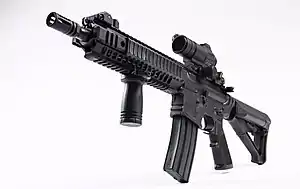 | Assault rifle | 5.56×45mm NATO | Primary service issued rifle.[32] Rifles are engraved honoring Colonel Sultan Mohammad Ali Al Ketbi.[32] | |
| FAMAS | 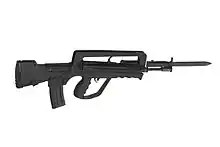 | Bullpup assault rifle | 5.56×45mm NATO | In use with the Special Forces.[33] | |
| AK-47 | Assault rifle | 7.62×39mm | Arsenal is captured or collected from enemy.[34] | ||
| FN FAL | Assault rifle | 7.62×51mm NATO | In reserve since 2010.[30] | ||
| Heckler & Koch G3 |  | Battle rifle | 7.62×51mm NATO | In reserve.[30] | |
| M4 carbine | 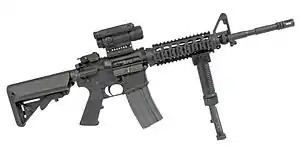 | Carbine | 5.56×45mm NATO | Previous standard issue service rifle. Purchased 2,500 M4 carbines in 1993.[35] | |
| M16A4 | 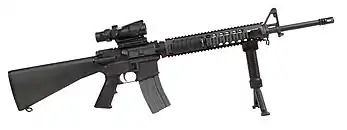 | Assault rifle | 5.56×45mm NATO | In reserve.[36] | |
| T91 assault rifle | 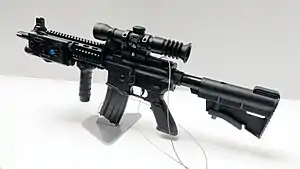 | Assault rifle | 5.56×45mm NATO | Special forces only. 30,000 rifles[37] | |
| Machine guns | |||||
| Fn M249 Saw |  |
||||
| FN Minimi |  | Light machine gun | 5.56×45mm NATO | Standard light machine gun of the United Arab Emirates Army. | |
| Heckler & Koch HK23E | General-purpose machine gun | 5.56×45mm NATO | HK23E variant.[30] | ||
| Heckler & Koch MG5 |  | General-purpose machine gun | 7.62×51mm NATO | ||
| M2 Browning |  | Heavy machine gun | 12.7×99mm NATO | Standard heavy machine gun United Arab Emirate. Mostly as vehicle armament.[30] | |
| Sniper rifles | |||||
| Lobaev Sniper Rifle |  | Sniper rifle | .50 BMG | ||
| Heckler & Koch MSG90 | Designated marksman rifle | 7.62×51mm NATO | |||
| M107/M107A1 | Anti-materiel rifle | 12.7×99mm NATO | Standard issue sniper rifle.[38] | ||
| Grenade launchers | |||||
| M203 grenade launcher |  | Grenade launcher | 40×46mm | ||
| Anti-tank weapons | |||||
| AT-5 Spandrel | 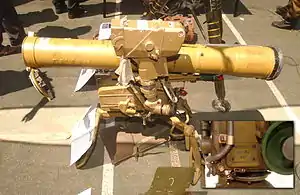 | Anti-tank missile | 135mm | ||
Decommissioned equipment
 AMX-30S – 45 (ordered 1977, is phased out from service)
AMX-30S – 45 (ordered 1977, is phased out from service) OF-40 Mk.2 – 36 (all of these MBT are phased out from service)
OF-40 Mk.2 – 36 (all of these MBT are phased out from service) Hwasong-5 - 25 (ordered 1989, decommissioned due to dis-satisfactory quality)[39][40]
Hwasong-5 - 25 (ordered 1989, decommissioned due to dis-satisfactory quality)[39][40]
Further reading
References
- Yates, Athol (2020). The Evolution of the Armed Forces of the United Arab Emirates. Warwick: Helion & Company. ISBN 9781912866007.
- Yates (2020). The Evolution of the Armed Forces of the United Arab Emirates. p. 220.
- Yates. The Evolution of the Armed Forces of the United Arab Emirates. p. 239.
- Yates. The Evolution of the Armed Forces of the United Arab Emirates. p. 233.
- Yates. The Evolution of the Armed Forces of the United Arab Emirates. p. 329.
- Yates (2020). The Evolution of the Armed Forces of the United Arab Emirates. p. 330.
- Yates (2020). The Evolution of the Armed Forces of the United Arab Emirates. pp. 330–331.
- Yates (2020). The Evolution of the Armed Forces of the United Arab Emirates. p. 331.
- al-Shamahi, Abubakr. "UAE mourns losses in Yemen". Alaraby.co.uk. Archived from the original on 12 November 2017. Retrieved 24 May 2017.
- Gardner, Frank (25 September 2015). "Yemen conflict: No end in sight, six months on". Bbc.co.uk. Archived from the original on 30 November 2016. Retrieved 16 January 2017.
- "Gulf of Aden Security Review - November 2, 2017". Critical Threats. Retrieved 2 November 2017.
- "UAE deploys troops to Yemen's Socotra island". The Daily Star Newspaper - Lebanon. 7 May 2018. Archived from the original on 7 May 2018. Retrieved 7 May 2018.
- "Anger erupts on Yemen's Socotra as UAE deploys over 100 troops". Al-Jazeera. Archived from the original on 7 May 2018. Retrieved 7 May 2018.
- "Patria.fi: Patria's AMV vehicle selected for United Arab Emirates (29.1.2008)".
- "Artem Defence" (PDF). Artem-defense.com. Archived from the original (PDF) on 7 July 2011. Retrieved 20 March 2018.
- "Image of Patria AMV with BMP-3 turred at IDEX 2007". Armyrecognition.com. Archived from the original on 19 March 2016. Retrieved 20 March 2018.
- "UAE orders Patria AMVs | IHS Jane's 360". Janes.com. Archived from the original on 30 January 2016. Retrieved 30 January 2016.
- United Arab Emirates has ordered Finnish-made Patria AMV 8x8 armoured vehicles Archived 30 January 2016 at the Wayback Machine - Armyrecognition.com, 28 January 2016
- Rosomak APC For The UAE. Agreement Finalized. Improved Armour, No Amphibious Capabilities. Archived 14 September 2017 at the Wayback Machine defence24.com
- "Patria AMV 8x8 armored combat proven in Yemen with UAE army - December 2017 Global Defense Security news industry - Defense Security global news industry army 2017 - Archive News year". Armyrecognition.com. Archived from the original on 15 December 2017. Retrieved 20 March 2018.
- "Trade Registers". Armstrade.sipri.org. Archived from the original on 14 April 2010. Retrieved 20 June 2013.
- "UN Register of Conventional Arms – UNODA". disarmament.un.org. Archived from the original on 14 December 2008. Retrieved 20 March 2018.
- "ACV-S Tracked Armoured Combat Vehicle". Arny-Technology. Archived from the original on 7 April 2014. Retrieved 9 May 2014.
- Archived 3 October 2011 at the Wayback Machine
- "ЦАМТО / Новости / Россия завершает программу модернизацию части парка БМП-3 армии ОАЭ". Armstrade.org. Archived from the original on 21 March 2018. Retrieved 20 March 2018.
- United States approved major contract of MRAP vehicles for UAE Archived 7 November 2014 at the Wayback Machine - Armyrecognition.com, 27 September 2014
- "Emirates' Fuchs will be most advanced yet". IHS Jane's. 10 May 2005. Retrieved 4 May 2016.
- "G6 155mm Self Propelled Howitzer, South Africa". Army-technology.com. Archived from the original on 19 September 2012. Retrieved 1 January 2010.
- "Janes | Latest defence and security news". Janes.com.
- Jones, Richard D. Jane's Infantry Weapons 2009/2010. Jane's Information Group; 35 edition (27 January 2009). ISBN 978-0-7106-2869-5.
- "UAE Armed Forces Unification Day: Report". Emirates News Agency. 4 May 2017. Archived from the original on 1 April 2019. Retrieved 4 October 2018.
- "UAE firearms manufacturer Caracal sees huge growth potential". Gulf News. 26 February 2015. Archived from the original on 3 October 2018. Retrieved 3 October 2018.
- Bishop, Chris. Guns in Combat. Chartwell Books, Inc (1998). ISBN 0-7858-0844-2.
- Richard D. Jones; Leland S. Ness, eds. (27 January 2009). Jane's Infantry Weapons 2009–2010 (35 ed.). Jane's Information Group. ISBN 978-0-7106-2869-5. Archived from the original on 4 April 2019. Retrieved 20 March 2018.
- Daniel Watters. "The 5.56 X 45mm: 1990–1994". Archived from the original on 4 January 2010. Retrieved 25 March 2009.
- Jane's Special Forces Recognition Guide, Ewen Southby-Tailyour (2005) p. 446.
- "UAE `given guns' for Chen visit". Taipeitimes.com. Archived from the original on 21 March 2018. Retrieved 20 March 2018.
- Gander, Terry (2006). Jane's Infantry Weapons 2006–2007. London: Jane's Information Group. p. 22. ISBN 0-7106-2755-6.
- Samuel Ramani. "Why Did the UAE Purchase Weapons From North Korea?". Thediplomat.com. Archived from the original on 9 August 2017. Retrieved 9 August 2017.
- United States, Congress. House. Committee on International Relations (2000). U.S. Policy Toward North Korea: Hearing Before the Committee on International Relations, House of Representatives, One Hundred Sixth Congress, First Session, Part 2. U.S. Government Printing Office. pp. 91–92. ISBN 9780160607646.
External links
- The Evolution of the Armed Forces of the United Arab Emirates by Athol Yates
- Ministry of Defence Web Site Arabic and English
- Official government.ae page
 This article incorporates public domain material from the CIA World Factbook document: "2003 edition".
This article incorporates public domain material from the CIA World Factbook document: "2003 edition".